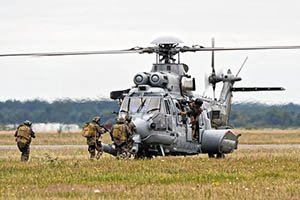The invasion of Ukraine, an exceptional risk
 The Russian-Ukrainian conflict has quickly spiraled down into a declared war involving not only the two countries mentioned but also all Western countries along with third countries.
The Russian-Ukrainian conflict has quickly spiraled down into a declared war involving not only the two countries mentioned but also all Western countries along with third countries.
This revival of the "East-West" war has triggered political, economic and environmental instability, as well as volatility in the prices of agricultural and energy products, affecting all financial markets and trade.
War is an exceptional risk for insurers who have definitely acquired a certain know-how in covering acts of piracy and other political risks such as terrorism, but they still do not have solutions for dealing with war situations.
Extraordinary events such as wars are risks of a systemic nature that the insurance industry, in its current form, is not able to handle.
In a globalized economic world, an armed conflict such as a foreign war affects in one way or another companies operating both locally and abroad. In addition to the significant direct damage, there is also collateral damage, affecting employees, assets, investments, revenues, supply chains, logistics, ...
The Russia-Ukraine war is a perfect illustration of the above. The war is not only causing extremely high human and material losses, but it is also affecting the entire economic sphere with the risk of a global recession.
According to the OECD estimates, the global economic impact of the conflict would currently amount to 1% of the world GDP, that is, 1 000 billion USD for the year 2022 alone.
Read also | War risk insurance
The war in Ukraine
The latest events in Ukraine have affected the war risk market.
The classification of the waters surrounding Russia and Ukraine as high-risk zones leads to an unannounced blockade and a strong limitation of travel in the region.
According to the International Maritime Organization, more than 100 foreign-flagged ships and more than 1000 seafarers from 20 different countries are blocked in Ukrainian ports as of 11 April 2022.
According to the International Transport Workers' Federation (ITF), 200 to 300 ships are blocked in the war zone. Among these ships are several grain carriers.
Since the beginning of the conflict, at least 10 merchant ships have been damaged by missiles or mines, including a Panamanian cargo ship which sank on 17 March. Another Dominican-flagged vessel suffered the same fate on 3 April.
Faced with this unstable situation, shipping rates have increased by an average of five times for container ships and by 182% for bulk carriers.
At the beginning of March, a shipowner sailing in the Black Sea had to pay an overload of 200 000 USD, equivalent to his annual premium.
Russia-Ukraine War: disruption of supply chains
Supply chains, severely disrupted by the global health crisis, are once again being challenged by the war in Ukraine. The lack of flow of goods, the immobilization of ships, the suspension of insurance coverage, and the stoppage of production are all factors that are hampering the process of supplying markets and companies around the world.
This context of tension on the logistics chain has been amplified with:
- the appearance of technical problems for shipowners transporting goods via the Black Sea and territorial waters affected by the conflict,
- the suspension of insurance coverage for ships, aircraft, cargo... in the risk areas,
- the enforcement of Western sanctions against Russia. Russian ships are banned from sailing in several ports,
- the deteriorating condition of many merchant ships in Ukraine,
- insecurity on shipping routes to and from the Black Sea, a region that has become critical for traders of agricultural and oil products,
- the disruption of trade access points,
- the deterioration of the condition of port infrastructures,
- increased marine transport costs for vessels and cargoes,
- the increase in selling prices of transported goods. The price of raw materials is up nearly 40% on average,
- the decrease in sea and air transport capacity with the immobilization of a large number of ships and planes,
- delays in delivery times,
- shortages of raw materials. In the long term, a prolonged conflict in Ukraine could deeply disrupt markets. The two countries in conflict, Russia and Ukraine, alone provide 29% of the world's wheat supply, 19% of corn and 80% of sunflower oil. A real threat to food security exists for some countries, particularly in Africa and the Middle East, which depend on imports of basic products.
Russia-Ukraine conflict: Insurance and war risks
Grounded aircrafts, damaged ships, destroyed buildings, bad debts, halted activities are as many kinds of prejudice that insurers will have to come to grips with during this Russia-Ukraine conflict.
As soon as hostilities began, the first reaction of the international market was to restrict its undertaking in the region by adopting a series of measures such as:
- the refusal of any new business that could expose insurers to potential losses,
- rewriting or reformulating policies to exclude war risks,
- the payment of additional premiums of a sometimes-exorbitant level for vessels crossing risky sea areas,
- the suspension of certain coverages related to war risks,
- the limitation of engagements,
- the non-renewal of coverage granted by the international market to activities in Russia and Ukraine. Western industrial or commercial companies wishing to continue operating in these two countries are required to underwrite new policies with local insurers.